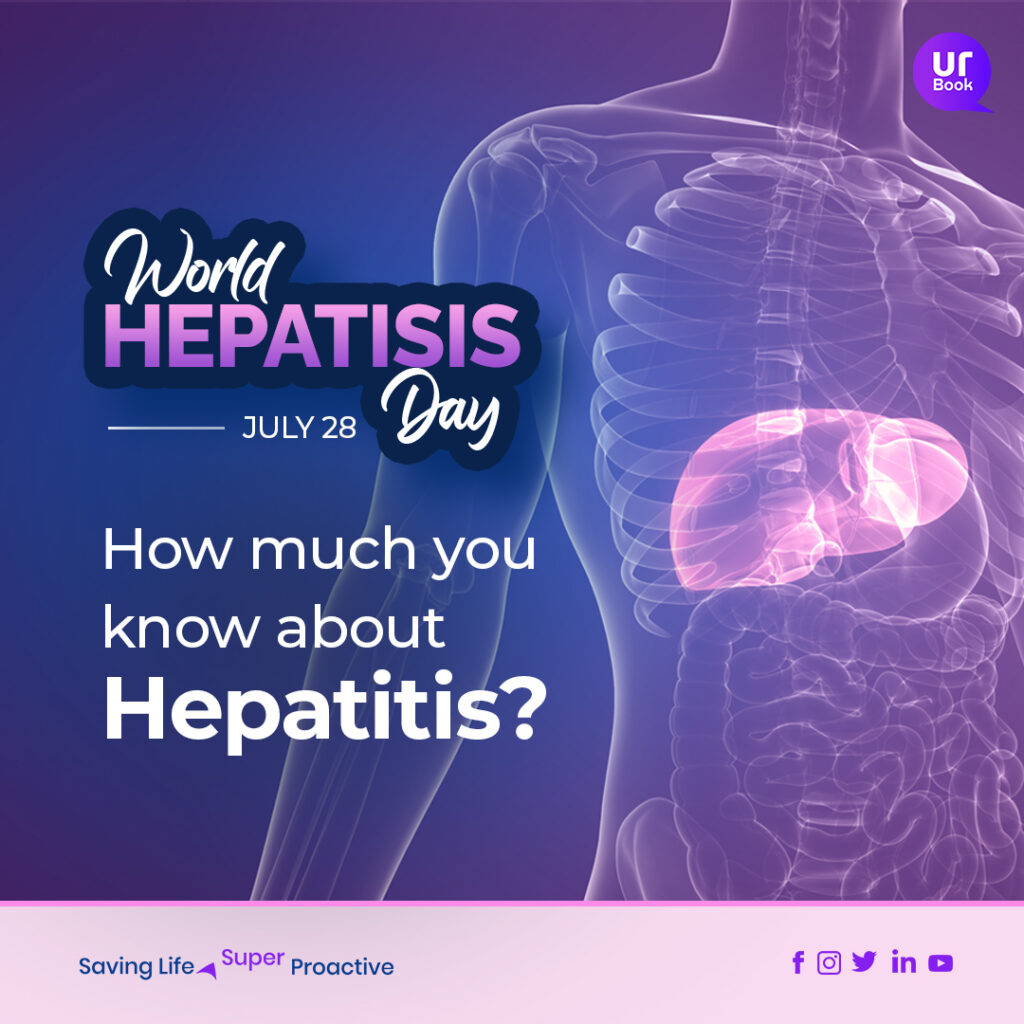
World Hepatitis Day – 2022
Hepatitis is an emerging global problem with almost 354 million people affected by it. The definition may just define Hepatitis as an inflammation of the liver, but the disease progression and lack of timely diagnosis make it a matter of serious attention.
The liver is an essential part of the human body; it acts as the main organ which helps your body consume nutrients from the food you eat. Furthermore, it filters out the toxins from the blood and metabolizes the medications you consume daily.
Hepatitis is considered one of the major infectious diseases after tuberculosis. Hepatitis can be either acute (short-term) or chronic (long-term). Acute hepatitis usually goes away on its own within a few weeks, but chronic hepatitis can last for years and become serious if left untreated.
If we talk about why do need to recognize a day after Hepatitis is because as per reports one person dies every 30 seconds from a hepatitis-related illness.
This makes it even more important to raise awareness, know more about the disease and make sure hepatitis is diagnosed on time. WHO aims that by 2030 we together can eliminate hepatitis. To achieve this we all need more awareness and knowledge.
Five types of hepatitis you should know about in World Hepatitis Day
Hepatitis A: occurs when you are infected with the Hepatitis A virus (HAV), and it falls under acute disease.
Hepatitis B: occurs when you are infected with the Hepatitis B virus (HBV), which falls under chronic conditions. Data suggests that more than 257 million people worldwide suffer from the Hepatitis B virus.
Hepatitis C: can occur when you are infected with the hepatitis C virus (HCV). It can cause acute and chronic hepatitis infections, ranging from mild to severe. Globally, an estimated 58 million people have chronic hepatitis C virus infection.
Hepatitis D: It occurs in people who are also infected with the hepatitis B virus, as the Hepatitis D virus needs the Hepatitis B virus to replicate. It can cause both acute and chronic hepatitis infections.
Hepatitis E: occurs when you are infected with the hepatitis E virus (HEV). It is a waterborne disease commonly found in unclean areas. Hepatitis E is acute but can be dangerous for pregnant women. Every year an estimated 20 million HEV infections occur.
Causes of hepatitis
The causes of hepatitis are not limited to only viruses; it can also be a complication due to consuming alcohol, toxic medicines, and harmful chemicals. But, most commonly, it spreads through the hepatitis virus.
Hepatitis A & Hepatitis E:
The most common route of spread is via food or water that is contaminated with the virus. The spread is also closely associated with inadequate sanitization, poor personal hygiene, and oral-anal sex
Hepatitis B & Hepatitis C:
The viruses are most commonly transmitted through contact with infected blood but can also be spread through contact with other bodily fluids, such as semen or vaginal fluid. And HBV and HCV are both transmitted through the same medium.
Hepatitis D:
HDV can be spread through sharing needles or other drug paraphernalia or from mother to child during childbirth. In short, HDV gets transmitted when a person contacts blood containing HDV.
Common Symptoms of Hepatitis (World Hepatitis Day) :
People suffering from hepatitis B and C will not show symptoms until the hepatitis virus damages the liver.
Some people with acute hepatitis may show symptoms after coming in contact with contaminated items or an infected person.
And these symptoms are as follows.
● Dark-urine
● Pale stool
● Abdominal pain
● Flu-like symptoms
● Weight loss
● Fatigue
● Jaundice (yellow skin and eyes)
How can hepatitis be diagnosed?
There are some tests that you need to take to know whether you are suffering from the hepatitis virus or not. Let’s look into the different tests that can help you get diagnosed with the hepatitis virus.
Physical examination
Diagnosing hepatitis will include your doctor physically examining your abdomen to see if there’s pain or tenderness. Experts can also check for any liver, yellow skin, and eye swelling.
Liver functioning tests
The most common blood test advised is the liver function test, which measures enzymes in the blood that are released when the liver is damaged.
Common blood tests
If those tests come back abnormal, your doctor may conduct other blood tests to detect the source of the problem in your body or identify the type of virus you are infected with.
These blood tests will check whether you have the hepatitis virus, which causes the problem, or the antibodies that help protect you from the virus. And you can also use it to check for autoimmune hepatitis.
How to treat each hepatitis virus individually?
The type of hepatitis you have and whether it is acute or chronic will determine how you are treated. Acute viral hepatitis frequently resolves by itself. You might only need to rest and drink enough fluids to feel better. But occasionally, it might be a more serious issue. You might even require hospitalization for your care.
The various chronic forms of hepatitis can be treated with various medications. Surgery and other medical procedures depending upon the case-to-case presentation are two additional treatments that are conceivable.
Preventing Hepatitis:
There are numerous ways to lower your risk of contracting hepatitis:
- Get the hepatitis A and hepatitis B vaccinations.
- Using protection while having sex.
- Maintain proper personal hygiene by washing your hands thoroughly with soap and water.
- Don’t use personal goods belonging to an infected person.
- When obtaining tattoos or body piercings, use caution.
- When visiting regions of the world with low sanitation, use caution. (Be sure to receive your vaccinations.)
- Consume bottled water while traveling and try eating at hygienic places
Complications
Hepatitis can be dangerous for several people suffering from chronic hepatitis B and C, as the virus directly affects the liver, causing more damage than other viral hepatitis viruses.
And, when the liver gets too damaged due to chronic hepatitis B and C, patients may face several complications, including liver cirrhosis, bleeding disorder, portal hypertension, kidney failure, death, etc.
“I can’t wait” is the theme campaign for World Hepatitis Day 2022 to make people aware of the disease and associated complications. The theme inspires us to get tested and not to wait for the disease to spread.
Appearing for tests and getting examined by Expert Doctors is the first step to fighting hepatitis.
